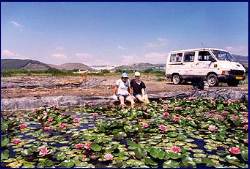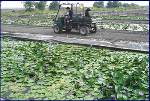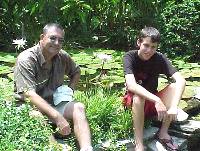
Hazorea Aquatics
Kibbutz Hazorea, Israel
Photos by Hazorea Aquatics, click to enlarge
Who would have guessed that a simple email inquiry about a waterlily name from someone named Danny Benjamin could lead us to a fascinating story? When it proved that the "il" in the email address wasn't Illinois but Israel, we began asking questions of our own! Danny is associated with Hazorea Aquatics, one of the world's largest waterlily farms, located in and owned by Kibbutz Hazorea in the Jezreel Valley in northern Israel.
Kibbutz Hazorea was founded in 1936 by a group of young German
immigrants on land that was partly  barren
and stony and part swamp, uninhabited and barren. The war of
independence came and went and most of the men and some of the
women from the kibbutz were called up to take part. Some of them
lost their lives. Others could not stand the difficult conditions
and left the kibbutz for the city or for other lands. Most stayed
to take part in the "once in a lifetime" opportunity
of building something where nothing had existed before.
barren
and stony and part swamp, uninhabited and barren. The war of
independence came and went and most of the men and some of the
women from the kibbutz were called up to take part. Some of them
lost their lives. Others could not stand the difficult conditions
and left the kibbutz for the city or for other lands. Most stayed
to take part in the "once in a lifetime" opportunity
of building something where nothing had existed before.
Over the years, a thriving community was built up with the help of additional groups of immigrants from around the world. The first buildings were built, further areas were cleared for crops and a big furniture factory started selling furniture to customers all over Israel. The Kibbutz set up it's own educational and health facilities as well as it's own unique method of self-government that was based on decisions being made by majority raising of hands at the weekly general meeting.
 Israel
has always had an acute water shortage and the decision to base
the Kibbutz agriculture on cotton involved the planning and execution
of a reservoir system to catch and hold rain water in the winter
- so that it could be used for irrigation of the cotton in summer.
It was not long before the members of the Kibbutz came up with
the idea of using the reservoirs for the raising of fish, and
very soon, Kibbutz fisheries came into existence all over Israel.
Israel
has always had an acute water shortage and the decision to base
the Kibbutz agriculture on cotton involved the planning and execution
of a reservoir system to catch and hold rain water in the winter
- so that it could be used for irrigation of the cotton in summer.
It was not long before the members of the Kibbutz came up with
the idea of using the reservoirs for the raising of fish, and
very soon, Kibbutz fisheries came into existence all over Israel.
Hazorea was one of the first Kibbutzim to try raising Koi
Carp as an export item. After a few years of trial and error,
numerous visits abroad and the import of brood stock from Japan,
Hazorea was able to export medium to high quality Koi to European
markets. It was not long before Israeli Koi were winning prizes
in competitions in Europe. Being in the ornamental fish business
brought Hazorea's marketing people into contact with customers
who also wanted aquatic plants, so Kibbutz Hazorea decided to
invest in a pilot project to grow water lilies, Cannas and water
Irises.
A lot of the Jezreel Valley, where Kibbutz Hazorea's fields are situated, was once swampland. The combination of the heavy soil, the long warm summer and the water from the fish ponds provide an ideal environment where water lilies thrive and propagate better than in most other places. The farm annually produces almost half a million lilies of about 100 true to type cultivars, primarily hardies. Most of the original stock has been obtained from Kirk Strawn and Perry Slocum. There are over 200 water lily ponds, each measuring about 165 feet by 20 feet.
 The
methods used at the Hazorea farm are different than methods used
in most other growing facilities. Specialized machinery has been
developed to cut down on the labor-intensive harvesting and cutting
- usually carried out by seasonal temporary labor. Hazorea harvests
its entire crop of lilies every year. All the lilies are taken
out in their entirety and the original rhizome is shipped to
customers while the eyes are replanted.
The
methods used at the Hazorea farm are different than methods used
in most other growing facilities. Specialized machinery has been
developed to cut down on the labor-intensive harvesting and cutting
- usually carried out by seasonal temporary labor. Hazorea harvests
its entire crop of lilies every year. All the lilies are taken
out in their entirety and the original rhizome is shipped to
customers while the eyes are replanted.
 Hazorea
Aquatics has generously allowed many of their waterlily images
to be included in our cultivar galleries. Their new cultivar
'Hazorea Dagan White' is among them.
Hazorea
Aquatics has generously allowed many of their waterlily images
to be included in our cultivar galleries. Their new cultivar
'Hazorea Dagan White' is among them.
|
|
|


